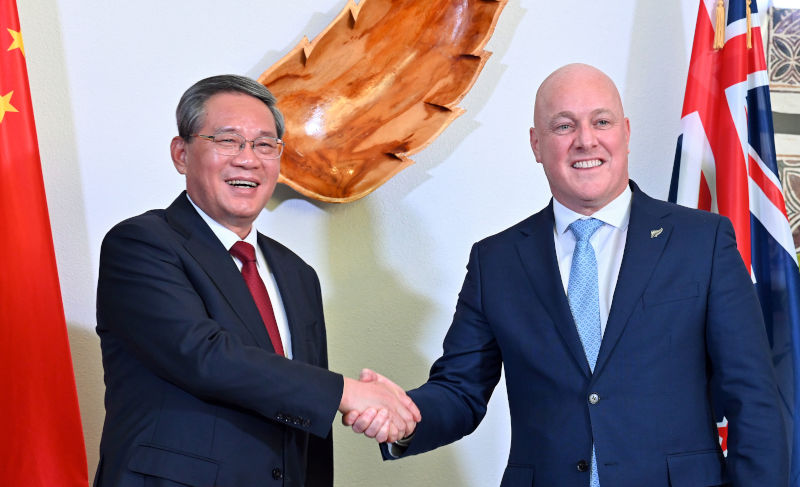Chinese Premier and New Zealand Prime Minister agree to differ during friendly visit
June 19, 2024
The Chinese Premier Li Qiang visited New Zealand last week (June 13-15) and held talks that were generally agreed to be frank but friendly. It was the highest ranking visit by a Chinese official for seven years and coincided with the tenth anniversary of a Comprehensive Strategic Partnership between the two countries.
Li Qiang was positive about the future of the two countries’ relationship. He said China is ready to be part of New Zealand’s ambition to double the value of its exports in the next decade and he offered some specific ways to improve the relationship.
He spoke about extending unilateral visa-free treatment to New Zealanders, supporting cultural and educational exchanges, and active participation in transport investment and infrastructure development in New Zealand. He said New Zealand would be invited to be the guest country of honour at the China International Import Expo in Shanghai in November.
For its part China needs New Zealand’s support for its application to join the Comprehensive and Progressive Trans-Pacific Partnership (the CPTPP). Consensus is required among the members to allow a new applicant to join. The current members are Australia, Brunei Darussalam, Canada, Chile, Japan, Malaysia, Mexico, New Zealand, Peru, Singapore, the United Kingdom, and Viet Nam. However Luxon said New Zealand won’t lobby for China or for any country.
Both sides agreed they had their differences but these would not prevent the future development of their relationship. In reply to a question about how much time the delegations spent talking about shared interests compared with their differences, Luxon said “50-50”.
Li said it was natural that the two countries did not always see eye to eye on everything. “But such differences should not become a chasm that blocks exchanges and cooperation between us. Instead it should be a driving force for us to learn from each other and grow together.”
“The growth of our relations has not only benefited the two peoples but also contributed to regional peace, stability and prosperity.”
He said the two governments should not interfere in each other’s internal affairs and they should promote common understanding and tolerance through dialogue and exchange.
There were two apparent efforts to derail the talks.
As the Chinese visit began the New Zealand news site Stuff released a documentary alleging Chinese interference in New Zealand through financial contributions to politicians and targeting dissidents.
The New Zealand Prime Minister Christopher Luxon said that in the talks with Li he raised the issue of foreign interference in New Zealand. He said “I expressed our view that foreign interference is something that we do not support from any country.”
Luxon said he also canvassed the AUKUS issue and the Chinese delegation expressed its concerns. The United States has proposed that New Zealand sign up to a “second pillar” of the AUKUS alliance.
The Chinese Government strongly objects to AUKUS under which Australia will field a fleet of nuclear powered submarines.
In what appeared to be another effort to disturb the friendly atmosphere in Wellington, as the meeting began US deputy secretary of state Kurt Campbell announced that New Zealand would attend the upcoming NATO summit in July alongside ‘AP4’ countries Australia, Japan and South Korea.
Luxon said he raised other difficult issues including the South China Sea and Taiwan Strait and said his government wants to see a de-escalation “so there is no miscalculation or accident that would threaten stability in the region.”
Luxon said the two delegations discussed other major issues including Israel and Gaza, Ukraine and North Korea.
Maintaining a healthy relationship is necessary for the continued mutually beneficial trading relationship. New Zealand is one of China’s major sources of dairy produce and other exports. China takes 21 percent of New Zealand’s merchandise exports, up from a mere 4 percent a decade ago.
China is New Zealand’s largest export market for every agricultural commodity except beef for which it is second behind the United States. China purchases a third of New Zealand’s dairy exports.
These considerations tend to counterbalance concerns in New Zealand about geopolitical tensions in the region, foreign interference and civil rights.
Stuff’s documentary and the American announcement about NATO failed to disrupt the cordial atmosphere and the meeting ended with optimism for the continued development of a mutually positive and beneficial relationship.

